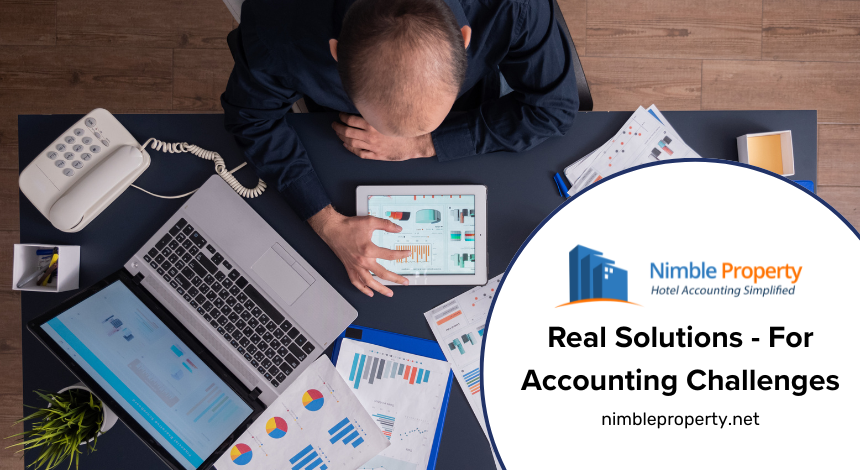In the rapidly changing and fast-paced hospitality industry, financial accuracy is essential. Whether you manage a network of hotels or a small hotel, keeping track of income, costs, and tax compliance can easily become too much to handle. Consider a front desk manager who is attempting to balance daily income from several sources while managing check-ins and check-outs. To make sure the finances balance, an overburdened accountant spends hours manually going through piles of invoices. In addition to being annoying, these difficulties may result in expensive mistakes and inefficiency.
Thankfully, contemporary AI-powered accounting programs like Nimble Property make financial management easier for hotel operators, transforming what once appeared to be a difficult task into a simplified, automated procedure. Let’s examine the three main accounting issues facing the hotel sector and how Nimble Property offers creative, automated, and intelligent solutions.
Managing Several Revenue Streams is the first challenge.
The Scenario:
Imagine a busy weekend at an exclusive resort. In addition to ordering room service, dining at the on-site restaurant, getting spa treatments, and attending business gatherings, guests are also checking in and out. Additionally, the hotel makes money from guided tours, minibar sales, and banquet space leases. Revenue is generated by each of these services through many channels, all of which require precise recording and reconciliation.
The Challenge:
Reservations for rooms, food and drink sales, event spaces, spas, gift shops, and more are some of the ways that hotels make money. There is a higher chance of mistakes, missing transactions, and erroneous financial reports when various revenue streams are tracked and combined by hand. Hotel managers and accountants could find it difficult to stay on top of real-time income tracking without a centralized system, which could result in mismanagement and financial disparities.
How Nimble Handles It:
– Automated Revenue Tracking: Nimble’s easy integration with Point-of-Sale (POS) and Property Management Systems (PMS) guarantees that every transaction is immediately recorded and categorized.
The ability to access real-time financial data at any time gives hotel owners and accountants the ability to identify revenue trends quickly and make well-informed business decisions.
Efficiency & Error Reduction: Nimble reduces the possibility of financial inconsistencies by automating data entry and reconciliation, minimizing human mistake, doing away with manual computations, and guaranteeing that revenue sources are appropriately documented.
Challenge 2: Cost Management and Expense Monitoring
The Situation:
The general manager of a hotel discovers, too late, that poor energy use has caused the monthly utility bill to soar. The food and beverage manager has inadvertently placed an over order for perishable goods, which has resulted in needless waste and increased expenses. It becomes extremely difficult to monitor and manage costs throughout the hotel when several departments are responsible for their own spending.
What’s at stake:
Payroll, utilities, maintenance, marketing, and guest amenities are just a few of the many costs hotels face. Costs can go out of control without a clear accounting system, which can result in budget overruns and decreased profitability. Ineffective manual procedures that don’t give real-time spending information are a problem for many hoteliers.
How Nimble Handles It:
Nimble’s automated expense categorization feature helps hoteliers identify areas of overspending and track spending trends by automatically classifying expenses into pre-established categories.
– Forecasting & Budgeting Tools: Nimble helps hotels to make data-driven financial decisions for improved cost control, track actual spending against budgeted estimates, and define financial goals.
– Custom Alerts & Notifications: The software sends real-time alerts for unusual spending patterns, helping hoteliers address financial issues proactively and prevent budget overruns.
Challenge 3: Ensuring Compliance with Tax and Financial Regulations
The Scenario:
A boutique hotel in New York receives a notice from tax authorities due to a miscalculation in occupancy taxes. The owner, already juggling daily operations, now faces penalties, additional paperwork, and potential reputational damage. In an industry where tax regulations are constantly evolving, staying compliant without an efficient system can be a nightmare.
The Challenge:
Hotels must comply with various tax regulations, including occupancy taxes, payroll taxes, and corporate income taxes. Keeping up with ever-changing tax laws, ensuring timely filings, and maintaining accurate financial records can be complex and time-consuming. A minor error in judgment might have serious financial and legal repercussions.
How Nimble Handles It:
Automated Tax Calculations: Nimble ensures adherence to local and federal tax laws by automatically calculating taxes based on real-time financial data.
– Tax Filing Assistance: By producing accurate tax reports and sending out timely filing reminders, the software lowers the possibility of penalties and missed deadlines.
– Audit-Ready Financials: Nimble keeps thorough and well-organized financial records, which lowers compliance risks and makes audits and financial reviews easier.
Conclusion:
The process of hotel accounting doesn’t have to be difficult or prone to mistakes. Hotels can increase profitability, decrease manual labour, and manage financial operations more effectively using AI-powered solutions like Nimble Property. Whether managing several revenue sources, controlling spending, or guaranteeing tax compliance, Nimble offers hoteliers the smart automation they require to maintain their financial stability and competitiveness.
Effective financial management is not just a benefit but also a requirement in the rapidly evolving hospitality industry. So that you can concentrate on providing outstanding guest experiences, why not let Nimble take care of the numbers?

